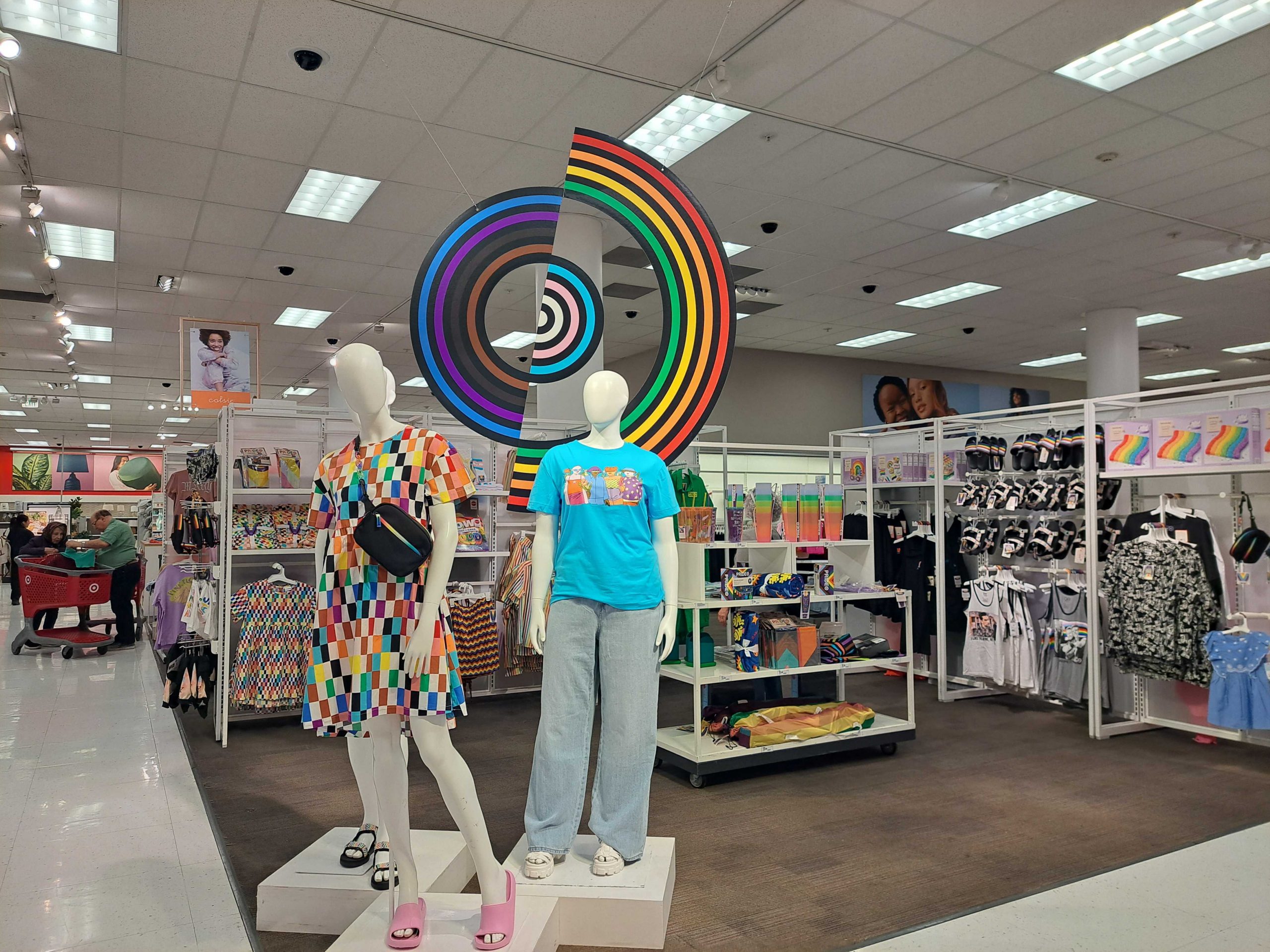Photo by Ava Rosenberg/OutWrite
“What do you mean they’re out of stock in all sizes? I’m wearing it,” I grumbled from the confines of a Target fitting room. My girlfriend was trying to find me a different size of the bright green Pride jumpsuit that has circulated TikTok, but, as we looked for more of the Pride collection items in different sizes, it became evident that many weren’t available online for pickup, delivery or shipping, despite being available in very small quantities in Westwood’s City Target.
Disappointingly, we discovered that these peculiar out-of-stock messages were all a part of Target’s decision to remove some products from stores, move Pride sections to parts of the stores with less foot traffic and discontinue some of the “more controversial” products altogether. In a statement on its website describing this decision, the retailer wrote, “For more than a decade, Target has offered an assortment of products aimed at celebrating Pride Month. Since introducing this year’s collection, we’ve experienced threats impacting our team members’ sense of safety and well-being while at work. Given these volatile circumstances, we are making adjustments to our plans, including removing items that have been at the center of the most significant confrontational behavior. Our focus now is on moving forward with our continuing commitment to the LGBTQIA+ community and standing with them as we celebrate Pride Month and throughout the year.”
These items include a tuck-friendly swimsuit that the retailer was falsely accused of selling to children. The swimsuit, which only comes in adult sizes, includes “extra crotch coverage” and “tuck-friendly construction” according to the product description. Such swimsuits are often expensive and come from online stores that make trying the item on before buying near impossible. Having this swimsuit available in a big box store made gender affirming swimwear accessible to people who may not be able to afford one from a specialized shop or may not feel safe ordering one to where they live.
Upon discovering the swimsuit had been removed from stores and online, UCLA student Willow Friet, who identifies as transgender, recalls, “When I saw online that Target was offering a swimsuit that was tuck-friendly, I was excited. Finally, I’d be able to try on a swimsuit in person that was built for bodies like mine. When I got to Target, I couldn’t find the suit. I went online and found that it had been pulled from all stores over the controversy.”
Aside from loss of accessibility to Pride and gender-affirming apparel, Target also failed by not notifying the designers of the items that were removed. UK designer Erik Carnell’s brand, Abprallen, was featured in the collection with a sweatshirt, fanny pack and tote bag. Carnell is a gay, transgender designer who makes statement pieces with pastel designs that convey important messages such as “Cure Transphobia, Not Trans People,” the phrase featured on his sweatshirt in the Target collection. After being accused of marketing clothing with “satanic messages” to children, the brand’s items were pulled from the collection both in-store and online. Carnell didn’t find out about this until it had already happened, and, like the other small businesses whose designs were pulled, the retailer offered no plans to pay them for the unsold merchandise or for what would become of it. In a statement on his Instagram account, the designer wrote “Somehow the religious right have twisted the narrative so much that they have themselves convinced I was, via Target, selling my entire brand’s collection to children specifically.” He concludes, “I have no desire to sell or market my work to children. They don’t have money, for one thing.” He continues to sell Abprallen designs on his Threadless and Etsy shops in the form of pins, shirts, hoodies, stickers and even skateboards.
Target has long been seen as a perpetrator of rainbow capitalism, in which companies use Pride flags and rainbow merchandise to make money during Pride month, but aren’t actively supportive of the LGBTQ+ community the rest of the year. Rainbow capitalism also includes discontinuing Pride merchandise and support of the LGBTQ+ community as soon as they become less profitable, which Target has done here. Pulling merchandise without warning is unfair to the small business creators who partner with Target to sell their products and sends a message to shoppers that the retailer’s support of the LGBTQ+ community is conditional, which is harmful in a time with so much radical hate aimed toward queer, and especially transgender, people.
While Target claims to be pulling items to protect their employees, they are neglecting the fact that violent, homophobic people are the cause of this danger, not the merchandise itself. They could have implemented more security to remove such hateful people from their stores or continued to carry the full collection online, but they chose not to.
So, as Pride month comes to an end and we look forward to the rest of the year, I implore you to buy clothing, accessories and more from the hundreds of queer and trans owned small businesses, especially those owned by queer and trans people of color. I’ve included some below, if you need any inspiration. I also remind you that large corporations are not your friend, ally or supporter. They exist to make money and typically won’t stand by anything that doesn’t help them accomplish that, especially when things get controversial. But, most importantly, I hope you will support the LGBTQ+ community with your words, actions and dollars, not only this month, but 24/7/365.
List of Queer and Trans-Owned Small Businesses
- Shop Kikay
- Abprallen
- cpikoart
- Geeky Teas and Games
- MegEmiko Art
- Wavy Rainbow
- MooMooDreams
- LittlePinkGoblin
Credits:
Author: Ava Rosenberg (She/They)
Artist: Ava Rosenberg (She/They)
Copy Editors: Maya Parra (She/Her), Emma Blakely (They/She/He)

